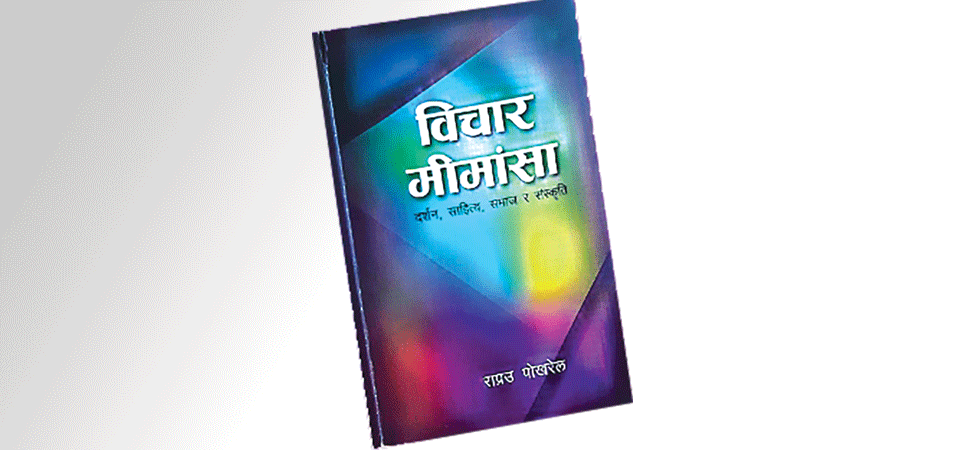A Firm Step Towards Nepal Study

Maheshwor Acharya
Critical and research-based, in-depth nonfiction writings are few and far between in Nepal, which indicates the limitation of Nepalese critical discourse. In this regard, Raprau (Ramji Prasad Upadhaya) Pokhrel's 'Bichar Mimamsa' is an exception. The book is a collection of twenty-two write-ups on different themes and topics.
In his book, Pokhrel has written on issues ranging from the Mahabharata and Radha Krishna's anecdotes to Buddhism. Also, he has discussed ever-popular BP Koirala, less discussed Tanka Prasad Acharya, now not known by many Yogi Naraharinath and the 'nation builder' Prithivi Narayan Shah.
On the literary front, he has made his commentary on Mahakavi Vidyapati, Laxmi Prasad Devkota, Madanmani Dixit, and Russian writer Alexander Pushkin.
Similarly, it includes commentaries on the books: Balkrishna Pokhrel's 'Khas Jati Ko Itihas', Saurav’s 'Aashamati', Margret Mitchell's 'Gone With the Wind', and a piece on Nepalese music.
The writer's effort in analyzing Mahabharata is praiseworthy. Mahabharata is such a dynamic work on which many discourses and analyses would be made relating to the present situation. Mahabharata is based on basic human nature and character, and as long as the human civilization exists, there would be the relevance of the Mahabharata.
A saint had once remarked that Mahabharata is a reference for 'what man should not do'. The Geeta, Vidurniti and many other anecdotes have made the Mahabharata timeless. In the present scenario, where discussion of the pure oriental texts seems faded and fragile, more and more should be written about them.
The writer's analytical take on major Mahabharata characters, in different essays, like Shree Krishna, Karna, Bhisma, and Yudhisthira is eye-opening to the readers who have not delved into the text.
The writer's reflection on the origin of religion against the backdrop of the Vedic past and Mahabharata is another worthy piece. He has analysed the religious ideology with the critical eye and acute apathy has been shown on the demerit of the 'karmakanda' which itself is a cancer of the 'Sanatana tradition. The present Nepali society which seems 'morally crippled' needs much of these kinds of writing.
In this regard, another piece on Radha-Krishna is equally serious. How the anecdote of Radha-Krishna was misinterpreted by Westerners has been dissected by the writer.
The essay on Buddhism is an equally important piece of writing, which tries to cover the past and the reason for the decay of Buddhism at its very origin, in this very sub-continent. Reading these articles is like reading the social history of this region simultaneously.
When the 'intellectual class' has realized that we are heading towards culturally and historically mutilated 'federalism', writings like these are even more imperative. In an essay on Prithivi Narayan Shah, the writer has tried to shed light on his contribution to the nation and why he was depicted as a tyrant beyond his credit. The same critical analysis he has been applied to writing on Yogi Naraharinath. These two articles, on Shah and Yogi, are serious texts on Nepal Study.
His two different takes on Tharu and poet Vidyapati have presented the Nepalese cultural diversity. His writing on Tharu, on the one hand, deals with the historicity of the Tharus and on the other on 'not home grown' filthy politics that divided the people. The writing was composed against the backdrop of the Terai turmoil a decade ago but is still relevant, to understand Terai politics.
On the political canvas, the writer's take on the swampy theoretical base and fragile economic view of BP Koirala, which Koirala himself had asserted and presented with due reference in the book, has presented a different picture to the readers. The critique of BP's political and economic views by the writer helps us to understand the limitation of the leader.
In a separate essay, the writer has discussed the political life of Tanka Prasad Acharya. How his prime minister-ship, patch up with King Mahendra, made the nationalistic moves that helped to secure the sovereignty of the nation is finely discussed by the writer. And, while doing this, how the two neighbours were dealt with strategically was an apt example of polity, which seems more relevant in present-day Nepal.
The writer, who suggested Madanmani Dixit write 'Madhavi', has also composed a profile of the popular writer. While doing so, he has not hesitated to comment on the weaker moves of Dixit. How the leftist Dixit supported the move made against the people by the then Panchayat has been described minutely by the writer.
Writer Pokhrel's 'Bichar Mimamsa' helps us understand our past, our tradition and our identity. No writer is perfect, still, the book is worth reading, if one wants to comprehend Nepal better.
Recent News

Do not make expressions casting dout on election: EC
14 Apr, 2022
CM Bhatta says may New Year 2079 BS inspire positive thinking
14 Apr, 2022
Three new cases, 44 recoveries in 24 hours
14 Apr, 2022
689 climbers of 84 teams so far acquire permits for climbing various peaks this spring season
14 Apr, 2022
How the rising cost of living crisis is impacting Nepal
14 Apr, 2022
US military confirms an interstellar meteor collided with Earth
14 Apr, 2022
Valneva Covid vaccine approved for use in UK
14 Apr, 2022
Chair Prachanda highlights need of unity among Maoist, Communist forces
14 Apr, 2022
Ranbir Kapoor and Alia Bhatt: Bollywood toasts star couple on wedding
14 Apr, 2022
President Bhandari confers decorations (Photo Feature)
14 Apr, 2022










